Texas Troops Caught in Fed vs States Immigration Battles (Again)
Oregon & Illinois fight Texas deployments to their states
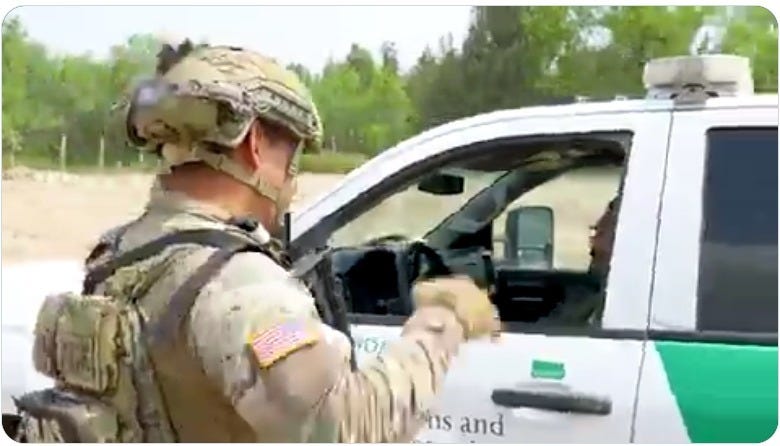
Texas National Guard troops, who once found themselves in the middle of a battle between State and Federal Authorities over immigration enforcement during the Biden administration, are now facing a similar situation (albeit under different circumstances) during the Trump Administration.
The conflict in which the troops were involved during the Biden era arose from their assignment by Governor Greg Abbott to curb illegal immigration into Texas following the 2021 implementation of “Operation Lone Star,” a state border-security mission that continues to this day.
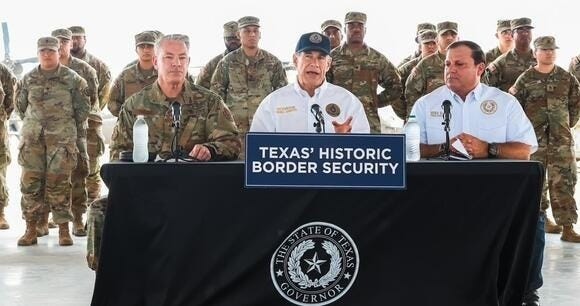
The Biden Administration opposed the Texas efforts, broadly arguing in court that immigration enforcement was solely a federal responsibility. They specifically opposed the state’s efforts to stop migrants from illegally crossing the Rio Grande into Texas by installing floating barricades in the middle of the river, as well as barbed wire along the riverbank on the Texas side of the international boundary.
The barriers- the Biden Administration claimed- kept Border Patrol Agents from reaching illegal aliens in distress.
Texas Border Czar Mike Banks (who now heads the US Border Patrol under President Trump) argued that the barriers would actually prevent drownings by discouraging migrants from attempting dangerous (and illegal) crossings:
One of the flashpoints in this battle between the Abbott and Biden Administrations occurred on September 25, 2023, when Border Patrol Agents were ordered to cut a section of the barbed wire that Texas had installed along the Rio Grande.
Hundreds of illegal aliens poured into the state as a result.
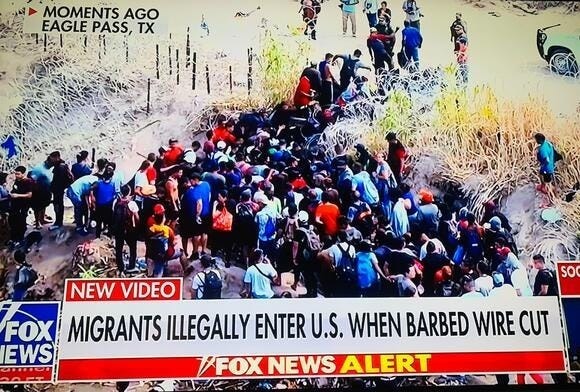
Federal Judges stopped the Biden Administration from removing additional sections of border barriers Texas had installed, including the floating “border wall” in the middle of the Rio Grande. Those barriers remain in place to this day.
(In fact, the Department of Homeland Security (DHS) plans to expand the floating barriers Texas placed on the Rio Grande).
Once President Trump took office, the relationship between Texas and Washington shifted from confrontation to cooperation.
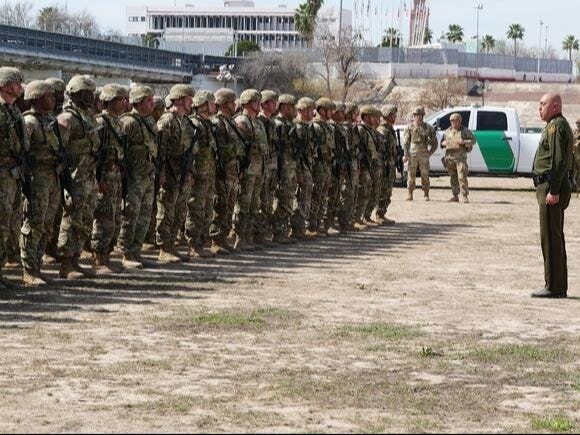
The Border Patrol has since sworn in hundreds of Texas National Guard troops to enforce federal immigration laws. Texas soldiers and Border Patrol Agents now work side-by-side along the Rio Grande.
This brings us to the legal battle between other states and the federal government that some of those Texas troops find themselves in today.
After protestors clashed with US Immigration and Customs Enforcement (ICE) Officers in Chicago and Portland, Oregon, Texas Governor Greg Abbott approved a Trump administration request for 400 Texas National Guard troops to assist in protecting federal facilities and officers in those cities.
Neither Oregon nor Illinois requested National Guard assistance, and both states are suing to prevent troops from being deployed there.
The legal battle has been especially chaotic in Oregon, where a federal judge first issued a temporary restraining order Saturday, stopping Oregon National Guard troops from being deployed against the Governor of that state’s wishes, then issued another order preventing California National Guard troops from being deployed there hours later.
And, since California’s Governor did not approve of his National Guard troops being deployed to Oregon, he sued as well:
On Sunday, when US District Judge Karin Immergut heard that Texas had agreed to send National Guard Troops to Oregon, she issued one more temporary injunction, forbidding National Guard troops from deploying to that state from ANY state and the District of Columbia.
Despite that, DHS Secretary Kristi Noem signalled later that night that the Trump Administration would contest those court orders by posting a video of arrests at the Portland ICE protests along with a vow that the DHS “will NOT ALLOW domestic terrorists to overrun our cities.”
On Monday, White House Spokesperson Karoline Leavitt confirmed that the Trump Administration would appeal Judge Karin Immergut’s orders, which Leavitt described as “untethered in reality and in the law.”
These legal battles over Texas sending its National Guard troops to other states (despite the objections of their governors) at the request of the Federal Government are likely only the first of many such battles, unless the Supreme Court ultimately weighs in on the issue.
And it’s a battle that’s been brewing for some time.
As far back as May 15, 2025, upon learning that the Department of Homeland Security was requesting “20,000 National Guard troops to help with mass deportations,” Governor Abbott replied on x.com that: “ Texas is in. Let’s get this done.”
Should Texas send troops to other states over the objections of their Governors upon request from the Federal Government?
Share your opinion in the comments on this article!
Abrazos,
Jack Beavers



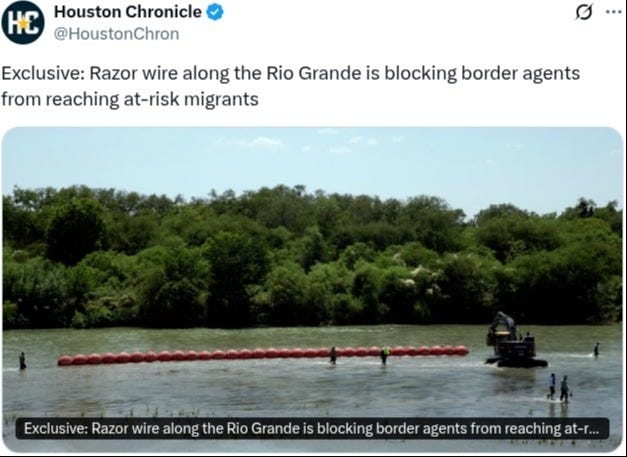


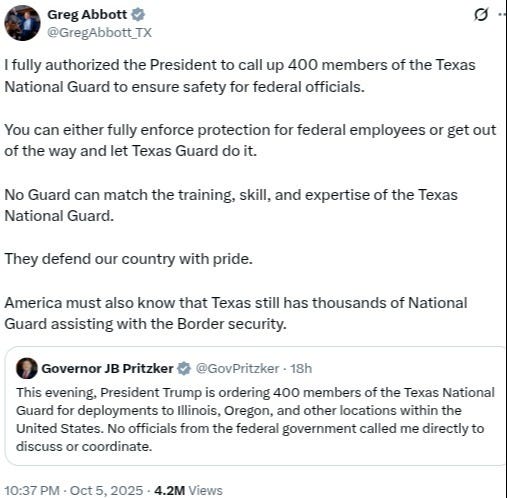
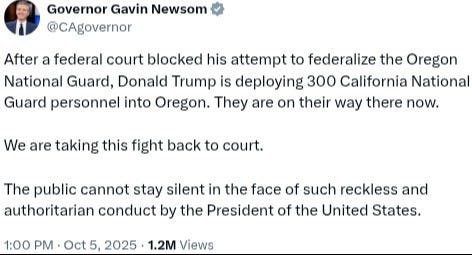
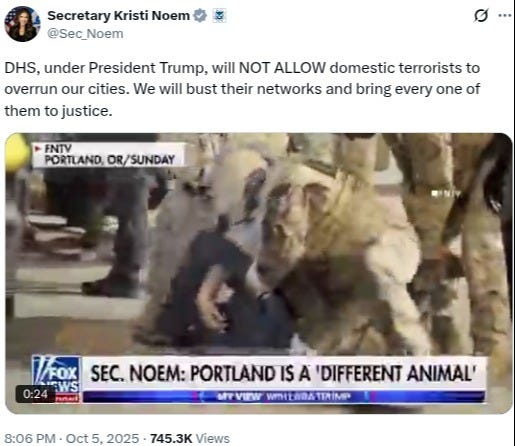
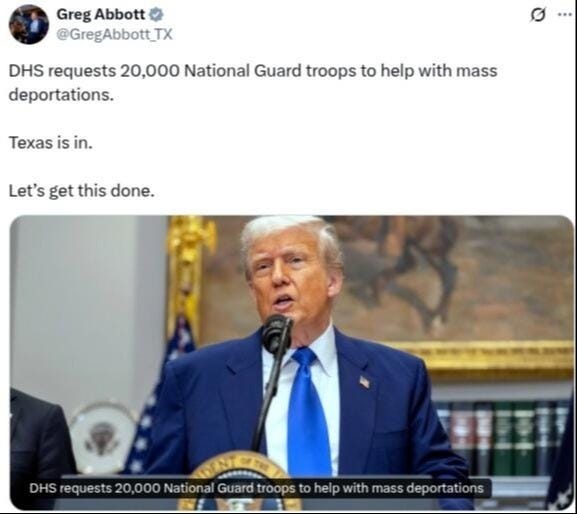


Jack, I thank God that President Dementia Joe is but a bleep in history. In 4 years he ruined our nation's reputation and safety. He and his "care takers " have a lot to answer to on his behalf. Jack thank you for your great service for us Patriots.
I think Abbott commissioning TX National Guard to Portland is returning the favor to the State of Oregon, whose interstate political export is trans anarcho-tyranny leading to trans shootouts, death here in Texas. Oregonian DSA tributaries send ANTIFA shock troops here, to Texas, to aid and sympathize with Mexican cartels. Trump & Governor Abbott simply respond in kind. If Governor Kotek wants to stop the flow of trans political violence pumping out of her state, she can declare has Oregon issue she has under control. Then I think the National Guard will lose interest.